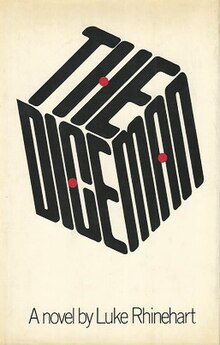| Revision as of 20:24, 24 August 2019 editTamfang (talk | contribs)Extended confirmed users, Pending changes reviewers, Rollbackers57,160 editsm →top: why, a, comma,?← Previous edit | Revision as of 19:59, 3 October 2019 edit undo108.5.96.108 (talk)No edit summaryNext edit → | ||
| Line 1: | Line 1: | ||
| {{Other uses|Diceman (disambiguation)}} | {{Other uses|Diceman (disambiguation)}} | ||
| {{refimprove|date=August 2011}} | |||
| {{infobox book | <!-- See Misplaced Pages:WikiProject_Novels or Misplaced Pages:WikiProject_Books --> | {{infobox book | <!-- See Misplaced Pages:WikiProject_Novels or Misplaced Pages:WikiProject_Books --> | ||
| | name = The Dice Man | | name = The Dice Man | ||
Revision as of 19:59, 3 October 2019
For other uses, see Diceman (disambiguation). First edition cover (US) First edition cover (US) | |
| Author | Luke Rhinehart |
|---|---|
| Language | English |
| Publisher | William Morrow (US) Talmy Franklin (UK) |
| Publication date | 1971 |
| Publication place | United States |
| Media type | Print (hardback & paperback) |
| Pages | 305 pp. |
| ISBN | 0-68-801457-7 |
| OCLC | 59367330 |
| Followed by | The Search for the Dice Man |
The Dice Man is a 1971 novel by George Cockcroft under the pen name Luke Rhinehart. It tells the story of a psychiatrist who begins making life decisions based on the casting of dice. Cockcroft wrote the book based on his own experiences of using dice to make decisions while studying psychology. The novel is noted for its subversion, anti-psychiatry sentiments and for reflecting moods of the early 1970s. Due to its subversive nature and chapters concerned with controversial issues such as rape, murder and sexual experimentation, it was banned in several countries. Upon its initial publication, the cover bore the confident subheader, "Few novels can change your life. This one will" and quickly became a modern cult classic. The book went through a number of republishings - in the United States it acquired the even more confident subheader "This book will change your life". It was initially not successful in the United States but did better in Europe, particularly England, Sweden, Denmark and Spain.
The themes of the book are continued in two other novels, The Search for the Dice Man and Adventures of Wim and a companion title, The Book of the Die.
Plot summary
The book tells the story of a New York psychiatrist named Luke Rhinehart who, feeling bored and unfulfilled in life, starts making decisions based on the roll of a dice. Along the way, there is sex, rape, murder, "dice parties", breakouts by psychiatric patients, and various corporate and governmental machines being put into a spin. There is also a description of the cult that starts to develop around the man, and the psychological research he initiates, such as the "Fuck without Fear for Fun and Profit" program.
References in popular culture
- The song "The Diceman" by Swedish band Vogon Poetry is inspired by the novel.
- Two plays have been produced based on the ideas in The Dice Man: The Dice House, written by Paul Lucas and produced by Neal Foster's Birmingham Theatre Company, and The Six Sided Man by Gavin Robertson.
- The script for Dice, a Canada/UK co-produced TV mini-series directed by Rachel Talalay in 2001, was inspired by The Dice Man.
- The song "Dice Man" by Mancunian band The Fall is inspired by the novel.
- The song "Such a Shame" by Talk Talk was inspired by The Dice Man, one of songwriter Mark Hollis' favourite books.
- The melodic death metal band At the Gates has quotations from the book in the songs "Blinded by Fear", "Slaughter of the Soul" and "World of Lies" from the Slaughter of the Soul album; the lyricist/vocalist Tomas Lindberg has cited it as a major lyrical inspiration.
- In an episode of the popular British soap opera Emmerdale, characters Cain Dingle and Jasmine Thomas discuss the novel and its direct themes.
- In episode #1.3 of TV mini-series The Game, the book is read by two characters on a train.
- In The Big Bang Theory episode "The Wiggly Finger Catalyst", Sheldon uses Dungeons and Dragons dice to help him make trivial decisions so that his mind is free for more important things.
Publishing history
- ISBN 0-900735-00-7 - September 9, 1971
- ISBN 0-246-11058-9 - July, 1978
- ISBN 0-586-03765-9 - April 13, 1989
- ISBN 0-87951-864-2 - July, 1998
- ISBN 0-00-651390-5 - December 15, 1999
- ISBN 0-00-716121-2 - April 7, 2003
References
- Adams, Tim (27 August 2000). "Dicing with Life". The Guardian. Retrieved 13 April 2009.
- "Luke Rhinehart - Author". h2g2.
- Trott, Barry; Fann, Kelly (2011). "Tapping Into The Appeal Of Cult Fiction". Reference & User Services Quarterly. 51 (1): 15–18. doi:10.5860/rusq.51n1.15.
- Dickson, E. Jane (4 November 2000). "Striptease at the roll of the dice". The Times.
- Three Days with the Dice Man
- Neiss, James (December 1991). "Talk Talk". Record Collector. No. 148. Diamond Publishing Group Ltd. pp. 18–23.
External links
| Luke Rhinehart | |
|---|---|
| Novels |
|
| Other books |
|
| Adaptations |
|